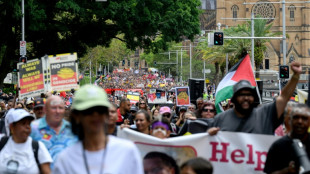Norway PM's left bloc set to win election, populist party surges
Norway's left-wing bloc led by Prime Minister Jonas Gahr Store looked on course to win Monday's legislative elections, which also saw a surge in support for the anti-immigration Progress Party, early projections showed.
The five-party left bloc was credited with a narrow majority of 87 to 89 of the 169 seats in parliament, compared to 80 to 82 for the right-wing opposition, figures from broadcasters TV2 and NRK showed, after polling stations closed.
"I have a good feeling. We've had a good election campaign," Store told his supporters just before the first results came out.
In power since 2021, Store looked poised to continue as head of a minority government, which is common in Scandinavia.
His Labour Party was seen coming out on top with around 28 percent of voter support.
If the figures are confirmed, Labour would need need the backing of the other four left-wing parties, which are divided on a myriad of issues, to obtain a majority to pass legislation and its budget.
- Fleeing wealth tax -
The election campaign in the wealthy nation of 5.6 million people centred largely on domestic issues like purchasing power, inequality, public services and taxes.
Several dozen wealthy Norwegians have fled to Switzerland in recent years to avoid wealth tax, and the two blocs have butted heads over whether to maintain or abolish the tax.
"What really has been a concern for people is their daily situation in their personal economy, how to cope with increasing prices," Store told reporters after casting his ballot with his wife at an Oslo school earlier in the day.
The election saw a surge in support for the anti-immigration, anti-establishment Progress Party, which doubled its score from the 2021 election.
Boosted by younger voters, in particular men, it became the leading opposition force with 24 percent of votes, according to projections, overtaking former prime minister Erna Solberg's Conservative Party.
"Do we want to continue as before, spending more and maintaining very high taxes without getting more for our money than neighbouring countries, or do we want to take back control and stop the waste," Progress Party leader Sylvi Listhaug told broadcaster TV2 on Monday.
- Trump effect -
Store had appeared out for the count just a few months ago, to the point where rumblings had begun to emerge about his succession.
But with his long experience in politics as both prime minister and previously as foreign minister, the 65-year-old has benefitted from voters' perceived need for stability following global turmoil over US President Donald Trump's policies, including over tariffs, as well as the war in Ukraine, political scientist Johannes Bergh told AFP.
Non-EU member Norway, a NATO member, shares a border with Russia in the Arctic and its economy is highly dependent on exports.
Store, who has run a single-party minority government, was also boosted domestically earlier this year by the return to government of popular ex-NATO chief Jens Stoltenberg.
Store's Labour Party will need the support of the Centre Party, the Greens, the Socialist Left and the communist Red Party.
But it will be tricky to get all their ducks in a row.
Labour is in favour of continuing the oil drilling that has made the country so prosperous, but it could be forced to compromise by some of its allies which want to phase out oil activities.
Labour and the Greens are meanwhile in favour of maintaining close ties with the EU, while the other parties on the left are staunch eurosceptics.
The far left wants the country's sovereign wealth fund, the biggest in the world, to divest from Israel, which Labour opposes.
The right-wing bloc -- four parties also divided on a range of issues -- meanwhile garnered 80 to 82 seats, according to projections.
Solberg's Conservatives were seen winning just 14 percent of votes, down from 20.4 percent in 2021.
While the parties in the left bloc had united behind Store as their prime ministerial candidate, the right had been divided with both Listhaug, 47, and Solberg, 64, vying for the post.
Z.Chakraborty--MT




